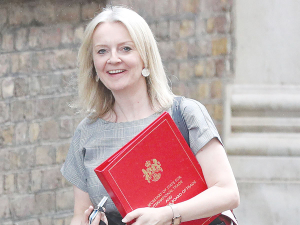Damien O’Connor: NZ united on global trade
When it comes to international trade, politicians from all sides of the aisle are united, says Labour's trade spokesman Damien O'Connor.
 UK Trade Secretary Liz Truss and NZ Trade Minister Damien O'Connor have committed to a FTA between the two countries.
UK Trade Secretary Liz Truss and NZ Trade Minister Damien O'Connor have committed to a FTA between the two countries.
What happens in the next few weeks will be critical for New Zealand to secure a free trade agreement (FTA) with the UK.
Dairy Companies Association (DCANZ) executive director Kimberly Crewther says there has been a commitment by both the UK Minister of Trade Liz Truss and our Agriculture and Trade Minister Damien O'Connor to come to an 'in principle' agreement on the FTA by the end of August.
She says while this is a positive step, it should be noted that such an 'in principle' agreement is not the final FTA document, which may take several more months.
However, the 'in principle' agreement is a clear indication that both sides are basically at one - although some 'technical' details still have to be worked through by both sides.
On expert commentator told Rural News that this commitment by the two ministers certainly paves the way for a final quality FTA. It's understod that the UK is pushing for greater access to NZ in terms of services - especially financial - while NZ has a strong focus on access for primary exports.
Crewther understands that negotiators from both sides are working hard to deliver on the ministerial promise. She says the agreement NZ is looking for is similar to the one the UK recently concluded with Australia.
"The UK agreement with Australia has an end point of complete tariff elimination and that's what we believe should be delivered in a FTA, and that's what we want for NZ," she says.
O'Connor is also positive about a deal, saying the UK is coming to terms with being separate from the EU. He says this means they need a global strategy of connecting with as many markets as possible.
The UK is also in the process of applying for membership of the Comprehensive and Progressive Agreement for Trans-Pacific Partnership (CPTPP), which require them to adopt a more liberal trade policy.
With the EU, Crewther is less optimistic, saying their past leaked offer in respect of an FTA was 'insulting and significantly inadequate'. She says any future offer would need to be a vast improvement to gain any credibility, as far as NZ was concerned.
"The ball is now in their court to come back with something that would actually meet the quality of what should be achieved," she says.
O'Connor concedes that it will take longer to get an FTA with the EU across the line. He says he had good meetings with politicians and officials in Brussels and gave them the message that a EU/NZ FTA would not spell ruin for their farmers.
"All were concerned that the trade agreement would not undermine any of their interests globally and we gave them that absolute assurance."
O'Connor hopes that early next year, they will reach a point where they can get a general agreement with the EU.
Additional tariffs introduced by the Chinese Government last month on beef imports should favour New Zealand farmers and exporters.
Primary sector leaders have praised the government and its officials for putting the Indian free trade deal together in just nine months.
Primary sector leaders have welcomed the announcement of a Free Trade Agreement (FTA) between India and New Zealand.
Dairy farmers are still in a good place despite volatile global milk prices.
Legal controls on the movement of fruits and vegetables are now in place in Auckland’s Mt Roskill suburb, says Biosecurity New Zealand Commissioner North Mike Inglis.
Arable growers worried that some weeds in their crops may have developed herbicide resistance can now get the suspected plants tested for free.